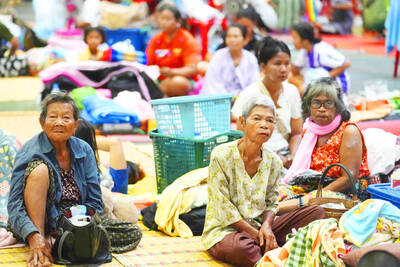The UN Security Council will approve new sanctions against Iran for refusing to suspend uranium enrichment -- but the timing is uncertain and the resolution may not get unanimous support.
US Ambassador Zalmay Khalilzad said last week a vote would be scheduled today. But council diplomats said on Wednesday it was likely to be delayed until next week to try to get four non-permanent members who have expressed concern about the resolution -- Libya, Indonesia, South Africa and Vietnam -- to back it.
The five veto-wielding permanent council members -- the US, Russia, China, Britain and France -- have already agreed on the draft resolution.
The five global powers and Germany offered Iran a package of economic incentives and political rewards in June 2006 if it agreed to freeze uranium enrichment before talks on its nuclear program. But Iran has refused, despite two previous sets of UN sanctions.
Russian UN Ambassador Vitaly Churkin was quoted by the ITAR-Tass news agency on Wednesday as saying: "Russia will support new Security Council resolution regarding Iran if Tehran does not halt uranium enrichment in coming days."
The resolution needs nine "yes" votes for adoption, and council diplomats say Italy, Belgium, Croatia, Panama, Burkina Faso and Costa Rica will support it, so it will pass easily.
But diplomats said the permanent members want the resolution to get unanimous approval, just as the previous sanctions resolution against Iran did, so closed-door talks have been taking place with the four reluctant members.
The diplomats spoke on condition of anonymity because the talks have been private.
Libyan UN Ambassador Giadalla Ettalhi told reporters on Monday that he would vote against the current draft, which would expand travel restrictions and the freezing of assets to more Iranian officials linked to the nuclear effort and impose a travel ban on some of those most involved in proliferation activities.
For the first time, it would ban trade with Iran in any goods that have both civilian and military uses.
It would also introduce financial monitoring on two banks and call on all countries "to exercise vigilance" in granting export credits, guarantees or insurance.
And it would authorize inspections of shipments to and from Iran that are suspected of carrying prohibited goods.

FOREST SITE: A rescue helicopter spotted the burning fuselage of the plane in a forested area, with rescue personnel saying they saw no evidence of survivors A passenger plane carrying nearly 50 people crashed yesterday in a remote spot in Russia’s far eastern region of Amur, with no immediate signs of survivors, authorities said. The aircraft, a twin-propeller Antonov-24 operated by Angara Airlines, was headed to the town of Tynda from the city of Blagoveshchensk when it disappeared from radar at about 1pm. A rescue helicopter later spotted the burning fuselage of the plane on a forested mountain slope about 16km from Tynda. Videos published by Russian investigators showed what appeared to be columns of smoke billowing from the wreckage of the plane in a dense, forested area. Rescuers in

‘ARBITRARY’ CASE: Former DR Congo president Joseph Kabila has maintained his innocence and called the country’s courts an instrument of oppression Former Democratic Republic of the Congo (DR Congo) president Joseph Kabila went on trial in absentia on Friday on charges including treason over alleged support for Rwanda-backed militants, an AFP reporter at the court said. Kabila, who has lived outside the DR Congo for two years, stands accused at a military court of plotting to overthrow the government of Congolese President Felix Tshisekedi — a charge that could yield a death sentence. He also faces charges including homicide, torture and rape linked to the anti-government force M23, the charge sheet said. Other charges include “taking part in an insurrection movement,” “crime against the

POINTING FINGERS: The two countries have accused each other of firing first, with Bangkok accusing Phnom Penh of targeting civilian infrastructure, including a hospital Thai acting Prime Minister Phumtham Wechayachai yesterday warned that cross-border clashes with Cambodia that have uprooted more than 130,000 people “could develop into war,” as the countries traded deadly strikes for a second day. A long-running border dispute erupted into intense fighting with jets, artillery, tanks and ground troops on Thursday, and the UN Security Council was set to hold an emergency meeting on the crisis yesterday. A steady thump of artillery strikes could be heard from the Cambodian side of the border, where the province of Oddar Meanchey reported that one civilian — a 70-year-old man — had been killed and

POLITICAL PATRIARCHS: Recent clashes between Thailand and Cambodia are driven by an escalating feud between rival political families, analysts say The dispute over Thailand and Cambodia’s contested border, which dates back more than a century to disagreements over colonial-era maps, has broken into conflict before. However, the most recent clashes, which erupted on Thursday, have been fueled by another factor: a bitter feud between two powerful political patriarchs. Cambodian Senate President and former prime minister Hun Sen, 72, and former Thai prime minister Thaksin Shinawatra, 76, were once such close friends that they reportedly called one another brothers. Hun Sen has, over the years, supported Thaksin’s family during their long-running power struggle with Thailand’s military. Thaksin and his sister Yingluck stayed